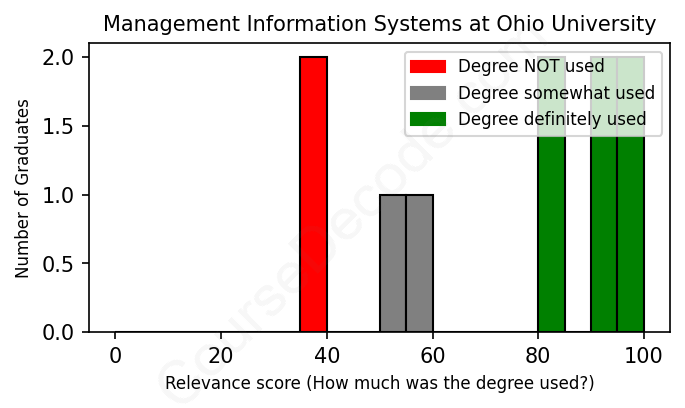
First, some facts. Of the Management Information Systems graduates from Ohio University we've analyzed , here's how many have used (or NOT used) their degree in their career:

These are estimates based on AI analysis of 10 LinkedIn profiles (see below).
The verdict? Above average. Overall, with an average relevance score of 73%, Management Information Systems graduates from Ohio University have a higher likelihood (+6%) of finding work in this field compared to the average graduate across all fields:
And for comparison, here's the chart for all profiles we've looked at across all degrees.
Also, after graduating, only 0% of these graduates have pursued further education other than another Bachelor's degree (such as a Masters degree or other), compared to the average across all profiles of 35%. This suggests a Bachelors degree is enough for most Management Information Systems graduates, and it's normal to look for work straight after graduation.
See the details:
|
Relevance score: 82% We think this person has gone into a career highly relevant to their degree. We think this person has gone into a career highly relevant to their degree.
DEGREE INFOGraduated in 2016 from Ohio University with a Bachelor of Business Administration (B.B.A.) in Management Information Systems. No other secondary education since. JOB HISTORY SINCE GRADUATIONBusiness Intelligence, Analyst JPMorgan Chase & Co. Jun 2016 - Jan 2019 Business Intelligence, Associate  JPMorgan Chase & Co. Jan 2019 - Jan 2020 Senior Business Intelligence Associate  JPMorgan Chase & Co. Jan 2020 - Sep 2021 Vice President - Product Owner  JPMorgan Chase & Co. Sep 2021 - Aug 2023 Vice President - Product Manager  JPMorgan Chase & Co. Aug 2023 - Present ABOUTInformation is the oil of the 21st century, and analytics is the combustion engine. |
The top 10 most common jobs done by the graduates we've analyzed (ranked most common to least) are:
When looking at the job history of graduates with a Management Information Systems degree from Ohio University, it’s clear that many of them have landed positions that are pretty relevant to the field. The most common roles include Business Analysts, Consultants, and positions at firms like JPMorgan Chase and EY. These roles often leverage analytical skills and knowledge of data and processes, which are key components of a Management Information Systems education. For example, jobs like SAP Consultant and various analyst positions seem to directly apply the skills learned during their studies, showing a strong connection to the core aspects of the degree.
However, not all positions are directly tied to the Management Information Systems discipline. Some graduates took on roles that didn't fully utilize their degree, such as Quality Engineer or even cashier roles, which focus more on operational tasks rather than leveraging the technical aspects of information systems. Moreover, a few graduate roles, like those at Accenture, appear to involve a mix of responsibilities that loosely apply some Management Information Systems concepts but don't delve deep into the core skills. Overall, while many graduates find jobs closely related to their education, there are definitely instances where they end up in roles that don’t strongly utilize their background in Management Information Systems.
Here is a visual representation of the most common words in job titles for Management Information Systems graduates (this is across all Management Information Systems graduates we've analyzed, not just those who went to Ohio University):

When looking at the career trajectories of graduates from the Management Information Systems program at Ohio University, it's clear that many have found their way into solid, relevant careers in tech and consulting. For their first jobs right after graduation, a lot of these grads tend to start as analysts or consultants at well-known companies like JPMorgan Chase, EY, and Deloitte. These positions often involve working with data, technology solutions, and business processes, which are right in line with what you’d expect from a degree in Management Information Systems. As they build experience, many seem to progress into more senior roles, like managers and directors, showing that there are good opportunities for advancement within their fields. For instance, some graduates have made the leap to vice president roles at companies like JPMorgan Chase, which indicates a strong upward trajectory.
However, not all pathways have been as straightforward. While many have solid careers in consulting and tech, a few have ventured into areas like merchandising, which may not utilize their MIS training as effectively. It's a mixed bag; some have quickly climbed up the corporate ladder, while others have taken a bit of a detour. Overall, though, the general trend leans toward successful careers within relevant fields, especially five to ten years post-graduation. So, if you're considering a degree in Management Information Systems at Ohio University, it looks like you're setting yourself up for some pretty good career prospects down the line!
Alright, so when it comes to a Bachelor’s degree in Management Information Systems (MIS) at Ohio University, it's pretty much on the moderate side of the difficulty spectrum. You’ve got your techy stuff, like learning about databases and cybersecurity, mixed in with some business courses, which can feel a bit like juggling at times. It’s definitely not a walk in the park—there’ll be some late nights of studying and group projects, but it's usually manageable if you stay organized and on top of your assignments. Plus, if you're into tech and enjoy problem-solving, you might find it more interesting than tough. Overall, it's a solid degree without being overly brutal.
Most commonly, in the LinkedIn profiles we've looked at, it takes people 4 years to finish a Bachelor degree in Management Information Systems.
So, looking through these profiles of Ohio University MIS grads, it really seems like they’ve been doing pretty well for themselves career-wise. A lot of them got into reputable companies and have climbed the ladder to higher positions like Senior Managers or Vice Presidents, which usually comes with a nice paycheck. For instance, some graduates have worked their way up at places like JPMorgan Chase and EY, known for their solid compensation packages, especially in managerial roles. On the flip side, there are a couple of grads who seem to be starting out in more basic roles, which might not be as lucrative right off the bat, like the one working as a Cage Cashier. Overall, though, it looks like many of these folks are on a decent path to making good money in the long run!
Here is a visual representation of the most common words seen in the "about" section of LinkedIn profiles who have a Bachelor degree in Management Information Systems (this is across all Management Information Systems graduates we've analyzed, not just those who went to Ohio University). This may or may not be useful:

Here are all colleges offering a Bachelor degree in Management Information Systems (ordered by the average relevance score of their Management Information Systems graduates, best to worst) where we have analyzed at least 10 of their graduates:
| College | Score | Count |
|---|---|---|
 The University of Alabama The University of Alabama
|
93 | 18 |
 The University of Georgia The University of Georgia
|
84 | 12 |
 University of South Florida University of South Florida
|
83 | 10 |
 University of Alabama University of Alabama
|
83 | 19 |
 San Jose State University San Jose State University
|
79 | 16 |
 University of Maryland Baltimore County University of Maryland Baltimore County
|
79 | 10 |
 University of Georgia - Terry College of Business University of Georgia - Terry College of Business
|
77 | 18 |
 University of Arizona University of Arizona
|
76 | 14 |
 Penn State University Penn State University
|
73 | 11 |
 Ohio University Ohio University
|
73 | 10 |
 Oklahoma State University Oklahoma State University
|
73 | 17 |
 Baylor University Baylor University
|
73 | 12 |
 University of Houston, C.T. Bauer College of Business University of Houston, C.T. Bauer College of Business
|
73 | 20 |
 Texas A&M University Texas A&M University
|
70 | 10 |
 The University of Texas at Austin The University of Texas at Austin
|
68 | 12 |
 University of Houston University of Houston
|
68 | 19 |
 East Carolina University East Carolina University
|
64 | 11 |
 Washington State University Washington State University
|
64 | 14 |